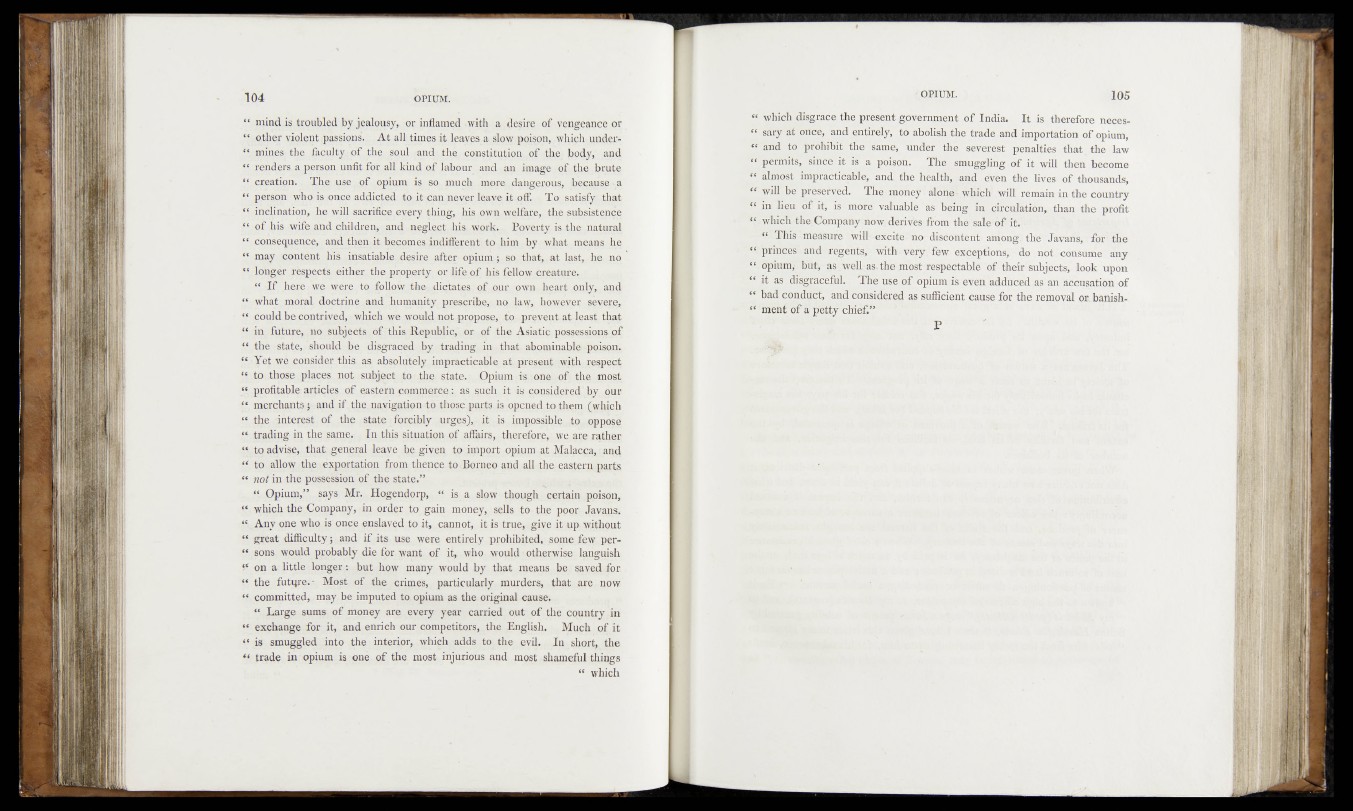
“ inind is troubled by jealousy, or inflamed-with a desire of vengeance or
“ other violent .passions. At all times it leaves a slow.poison, .which, under«
*‘ mines the faculty:of the soul and the consliti^tipii.pf the bp<Jy, and
“ renders a, person unfit for all kind of labour and , an image fq£,the brjite
“ creation. Tfle pse of, opium is so much more t dangerous, because . a
“ person wop is once addicted to it can never leave it off. To satisfy that;
“ inclination, he will sacrifice every thing, his own welfare, thp .subsistenqq
“ of his wife nand children, and negleqt his work^ Poverty is.^tejnatural
“ consequence, and then it becomes indifferent to him by what means be
“ may content his insatiable-desire after opium; so that, at last, he no
“ longer respects either the property or, life,of his fellow creating«!,. <.
“ If here i we wer^tofpllqw the, dictates of, our.;p\yn. heart only, and
.‘‘ what moral doctrine, and humanity prescribe, no law, however severe,
“ could be contrived, which we would not propose, to,, prevent-at least, that
“ in future,.no subjects of this Republic, or of the Asiatic.possessiopshf
“ the state,- should be disgraced by trading in that abominable-poison»
“ Yet we consider this as absolutely impracticable at present wi^.rpspqqj;
“ to those places not subject.to the state.- Opium is one.,ofj, the most
i profitable articles of pastern commerce^ as such it is, considered,'by, our
‘‘, merchants^-and ifjbteunavigation to those parts is ogepedto tb.em (which
“ the -interest, of thp state forcibly urges),.-, it is impossible ,tov oppose
“ trading in the same.- In this situation of affairs, therefore, we ane rather
I to advise» that, general leave l^e given to iinport opium at Malacqa, and
*<. to allow the exportation from thence to Borneo and all the eastern.parts
“ «of in the possession of the state.”
. ‘‘ Opium,”, says Mr. Hogendorp, “ is a slow though, certain .poison,
“ which the Company, in order ^ gain money, sells to the poqr; Javajns.
“ .A-nv one who if onqe. enslaved to it, cannot, it is true, give it up-withput
“ great difficulty; ..and if its use were entirely prohibited, sorpe fey^ per-
“ sons would probably die for want of it, who would • otherwise languish
on a little longer: but how many would by that means be saved for.
“ the futijre. • Most of the crimes, particularly murders, that are now
“ committed, may be imputed to opium as the original cause.
“ Large sums of money are every year carried out of the country in
“ exchange for it, and enrich our competitors, the English. Much of it
“ is smuggled into the interior, which adds to the evil. In short, the
“ trade in opium is one of the most injurious and most. shameful things
“ which
which disgrace the Resent government of India. It is, therefore neces-
?ary7afbnc'e, and entirely, to abolish the trade and importation of opium,
anl t6 ^ ^ 6it thq sa^'e,"under penalties that, the law
JieMiits, sjnce'ip^ poison. The^ smuggling.of it will then become
almost imprkqticab'le; and the hjeab^and even^Ee livesr of thousands,
wilfbe preserved. The- money - alone-^wlifch* will remain imthe country
ih lieu of it, is more valuable qs' being" rinVcirculation, than the profit
i wbidH%6|.©ompahvy now. derives-from V-'3
-‘ATffis-- measure will excite^o-dischnthinff- atn'hng? th%rJkvanS,\ fof the
princes’-and regents,': With^yeiyfffew excepfipns, -do :npfcconsunJe’J any
opium,-. but; as :well as.the yhbstuespectable’ of?theij7&ubjects,- look upon
it as disgraceful. use of opium iis even‘'add&53ed^as an accusation of
bad conduct, and consider-®! as sufficient cause for the removal on banish,
raent of If petty chief.” 1^
P